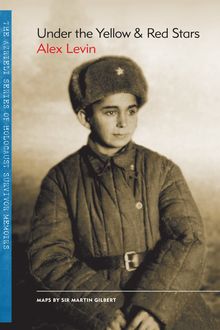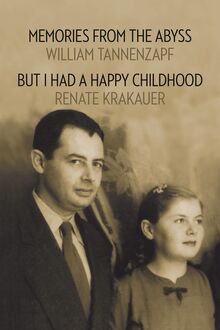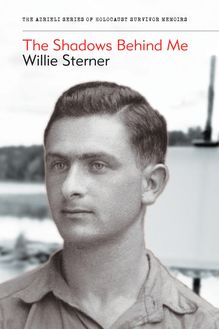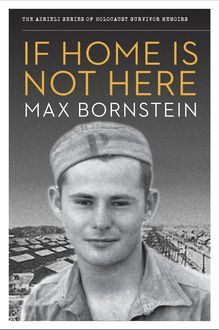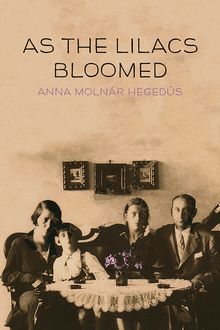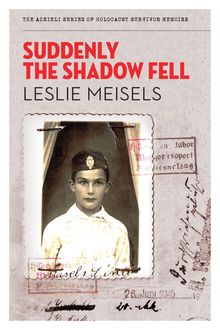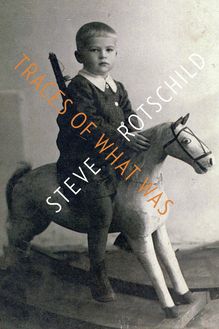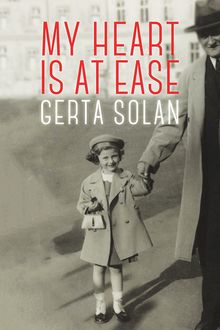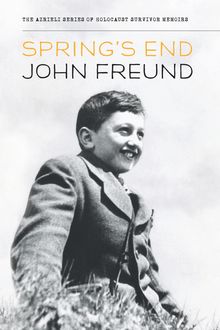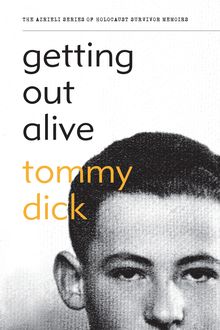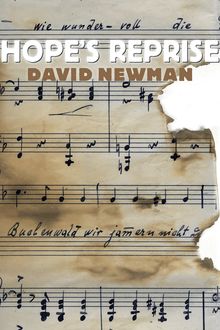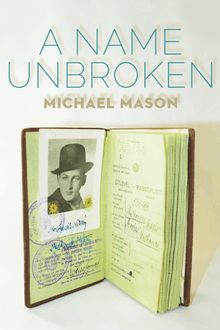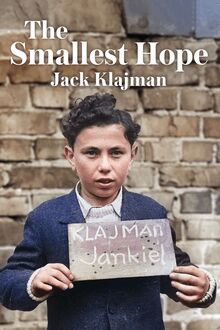-
 Univers
Univers
-
 Ebooks
Ebooks
-
 Livres audio
Livres audio
-
 Presse
Presse
-
 Podcasts
Podcasts
-
 BD
BD
-
 Documents
Documents
-
- Cours
- Révisions
- Ressources pédagogiques
- Sciences de l’éducation
- Manuels scolaires
- Langues
- Travaux de classe
- Annales de BEP
- Etudes supérieures
- Maternelle et primaire
- Fiches de lecture
- Orientation scolaire
- Méthodologie
- Corrigés de devoir
- Annales d’examens et concours
- Annales du bac
- Annales du brevet
- Rapports de stage
La lecture à portée de main
Vous pourrez modifier la taille du texte de cet ouvrage
Découvre YouScribe en t'inscrivant gratuitement
Je m'inscrisDécouvre YouScribe en t'inscrivant gratuitement
Je m'inscrisEn savoir plus
Vous pourrez modifier la taille du texte de cet ouvrage
En savoir plus

Description
Sujets
Informations
| Publié par | Azrieli Foundation |
| Date de parution | 01 septembre 2013 |
| Nombre de lectures | 3 |
| EAN13 | 9781897470725 |
| Langue | English |
| Poids de l'ouvrage | 2 Mo |
Informations légales : prix de location à la page 0,0300€. Cette information est donnée uniquement à titre indicatif conformément à la législation en vigueur.
Extrait
Gatehouse to Hell
Felix Opatowski
The Azrieli Series of Holocaust Survivor Memoirs
INTERNATIONAL ADVISORY COUNCIL
Doris Bergen, Chancellor Rose and Ray Wolfe Chair in Holocaust Studies, University of Toronto
Sara R. Horowitz, Director of the Israel and Golda Koschitzky Centre for Jewish Studies, York University
Nechama Tec, Professor Emerita of Sociology, University of Connecticut
Avner Shalev, Chairman of the Yad Vashem Directorate, Jerusalem
Naomi Azrieli, Publisher
Andrea Knight, Managing Editor
Arielle Berger, Editor
Mia Spiro, Editor
Elizabeth Lasserre, Senior Editor, French-Language Editions
Aurélien Bonin, Assistant Editor / Researcher, French-Language Editions
Elin Beaumont, Outreach and Communications Manager
Tim MacKay, Program Assistant
Susan Roitman, Executive Coordinator
Mary Mellas, Executive Coordinator
Mark Goldstein, Art Director
Nicolas Côté, Layout, French-Language Editions
Maps by François Blanc
Contents
The Azrieli Series of Holocaust Survivor Memoirs
Series Preface:In their own words...
About the Glossary
Introduction
Dedication
Prologue
My Childhood in Lodz
The War Begins
Weisser Adler
Auschwitz
The Neutral Zone
Uprising
Leaving Auschwitz
Liberation
Epilogue
“The Song of the Partisans:” Zog Nit Keyn mol/Never Say
Glossary
Photographs
Copyright
About the Azrieli Foundation
Also Available
Series Preface:In their own words...
In telling these stories, the writers have liberated themselves. For so many years we did not speak about it, even when we became free people living in a free society. Now, when at last we are writing about what happened to us in this dark period of history, knowing that our stories will be read and live on, it is possible for us to feel truly free. These unique historical documents put a face on what was lost, and allow readers to grasp the enormity of what happened to six million Jews – one story at a time.
David J. Azrieli , C.M., C.Q., M.Arch Holocaust survivor and founder, The Azrieli Foundation
Since the end of World War II , over 30,000 Jewish Holocaust survivors have immigrated to Canada. Who they are, where they came from, what they experienced and how they built new lives for themselves and their families are important parts of our Canadian heritage. The Azrieli Foundation’s Holocaust Survivor Memoirs Program was established to preserve and share the memoirs written by those who survived the twentieth-century Nazi genocide of the Jews of Europe and later made their way to Canada. The program is guided by the conviction that each survivor of the Holocaust has a remarkable story to tell, and that such stories play an important role in education about tolerance and diversity.
Millions of individual stories are lost to us forever. By preserving the stories written by survivors and making them widely available to a broad audience, the Azrieli Foundation’s Holocaust Survivor Memoirs Program seeks to sustain the memory of all those who perished at the hands of hatred, abetted by indifference and apathy. The personal accounts of those who survived against all odds are as different as the people who wrote them, but all demonstrate the courage, strength, wit and luck that it took to prevail and survive in such terrible adversity. The memoirs are also moving tributes to people – strangers and friends – who risked their lives to help others, and who, through acts of kindness and decency in the darkest of moments, frequently helped the persecuted maintain faith in humanity and courage to endure. These accounts offer inspiration to all, as does the survivors’ desire to share their experiences so that new generations can learn from them.
The Holocaust Survivor Memoirs Program collects, archives and publishes these distinctive records and the print editions are available free of charge to libraries, educational institutions and Holocaust- education programs across Canada. They are also available for sale to the general public at bookstores.
The Azrieli Foundation would like to express appreciation to the following people for their invaluable efforts in producing this series: Simone Abrahamson, Florence Buathier, Jesse Cohoon, Darrel Dickson (Maracle Press), Sir Martin Gilbert, Stan Greenspan, Robin Harp of the US Holocaust Memorial Museum, Richard Mozer, Arnaud Regnaud, Sylwia Szymańska-Smolkin, Keaton Taylor, Lise Viens, Margie Wolfe and Emma Rodgers of Second Story Press, and Piotr Wróbel.
About the Glossary
The following memoir contains a number of terms, concepts and historical references that may be unfamiliar to the reader. For information on major organizations; significant historical events and people; geographical locations; religious and cultural terms; and foreign-language words and expressions that will help give context and background to the events described in the text, please see the glossary beginning on page 145.
Introduction
A warm and humourous man with a precise memory for unique events in his difficult past and a way with the words, it is clear that Felix Opatowski needs to tell his story so many years after the events of World War II . At the same time, the relative ease with which he recounts his experiences in Gatehouse to Hell cannot quite allow us to forget the enormous effort it took to hold himself together while having to face, and therefore relive, the memory of the ghetto, the harsh existence in Auschwitz, the profound losses, the indescribable pain.
In telling us this story of his memories of family lost, pain and guilt, Felix warns us that “the line of sanity had been stretched to its limit” complicating, intensifying and simultaneously constraining the fullness of recall. Yet all the while, Felix manages to hold on to an array of wretched experiences filed away in his catalogue of memories during the sixty-six years since he was “liberated” from his hell, or, as Felix writes, since that moment when he “re-entered the world.”
Felix Opatowski begins his memoir by asking the question: “How can anyone imagine the mental state of a survivor?” And yet, Gatehouse to Hell is exactly this attempt. Making optimal use of the flexible literary form that is memoir, Felix portrays his own mental state as a survivor of Auschwitz by remembering with meticulous detail all that he can, while at the same time maintaining confidence that what the survivor forgets carries with it its own kind of validity, and that his experience of both is what really matters. It is in this context that Felix uses his memories to establish a solid framework from within which he situates his experience, thereby revealing “the mental state of a survivor.” He recalls camps and subcamps, labour battalions and forced marches during the worst years of Hitler’s rage against Poland and Polish Jewry, against Roma, Sinti and others declared “anti-social,” against Polish intellectuals and clergy, against communists and socialists, against Germany’s disabled children, against gay and lesbian citizens, and many others.
Appropriately, because Felix Opatowski has chosen to use an autobiographical genre and not a historical one, his narration follows certain generic rules common to all such texts. 1 Thus, it is not surprising to find that Felix’s stories and memories both corroborate and at the same time challenge other stories we have been lucky to inherit through autobiographical writing and other forms of life writing. Felix helps to amplify our knowledge about the Holocaust in particular ways, such as providing his view of the politics of the “grey zone” of camps, ghettos and forced marches where desperate human beings do not always behave honourably, a topic not easily described in earlier decades. For example, Florian Freund’s study of Ebensee – the last camp Felix endured – indicates a hierarchy of prisoners in this grey zone that Felix’s narrative often underscores. The citizens of Poland and the Soviet Union were treated terribly from the start, “but on the lowest rung of the ladder…stood the Jews and the gypsies.” 2 Like many other Jewish narrators, most notably Primo Levi, Felix feels it is his responsibility to describe his torment as a memorial to the many who did not make it through the same period.
Felix’s ability to retell the story of turmoil is punctuated by complex interruptions and challenges – as practical as the level of his fluency in English in the early days of immigration to Canada in 1949 with his beloved wife and first child, or as fleeting as the contours of stories told to him, or qualified by oscillating personal experience, point of view and even “rumours.” Opatowski quietly acknowledges that emerging from his camp experiences was “as if I were coming out of some sort of daze.” He issues a challenge to scholars, in the same vein as others have done before him: we will “never know everything about the camp” he warns, “because nobody ever really knew everything about Auschwitz.” And yet we all try.
The telling of Felix’s story reminds us that if we are troubled by the difficulty of writing a memoir situated in the terror legislated by a state against its neighbours and its citizens, we miss out on the details of each memoirist’s unique and always uneasy recounting of the Holocaust. We miss out on the different ways in which t
-
 Univers
Univers
-
 Ebooks
Ebooks
-
 Livres audio
Livres audio
-
 Presse
Presse
-
 Podcasts
Podcasts
-
 BD
BD
-
 Documents
Documents
-
Jeunesse
-
Littérature
-
Ressources professionnelles
-
Santé et bien-être
-
Savoirs
-
Education
-
Loisirs et hobbies
-
Art, musique et cinéma
-
Actualité et débat de société
-
Jeunesse
-
Littérature
-
Ressources professionnelles
-
Santé et bien-être
-
Savoirs
-
Education
-
Loisirs et hobbies
-
Art, musique et cinéma
-
Actualité et débat de société
-
Actualités
-
Lifestyle
-
Presse jeunesse
-
Presse professionnelle
-
Pratique
-
Presse sportive
-
Presse internationale
-
Culture & Médias
-
Action et Aventures
-
Science-fiction et Fantasy
-
Société
-
Jeunesse
-
Littérature
-
Ressources professionnelles
-
Santé et bien-être
-
Savoirs
-
Education
-
Loisirs et hobbies
-
Art, musique et cinéma
-
Actualité et débat de société
- Cours
- Révisions
- Ressources pédagogiques
- Sciences de l’éducation
- Manuels scolaires
- Langues
- Travaux de classe
- Annales de BEP
- Etudes supérieures
- Maternelle et primaire
- Fiches de lecture
- Orientation scolaire
- Méthodologie
- Corrigés de devoir
- Annales d’examens et concours
- Annales du bac
- Annales du brevet
- Rapports de stage

